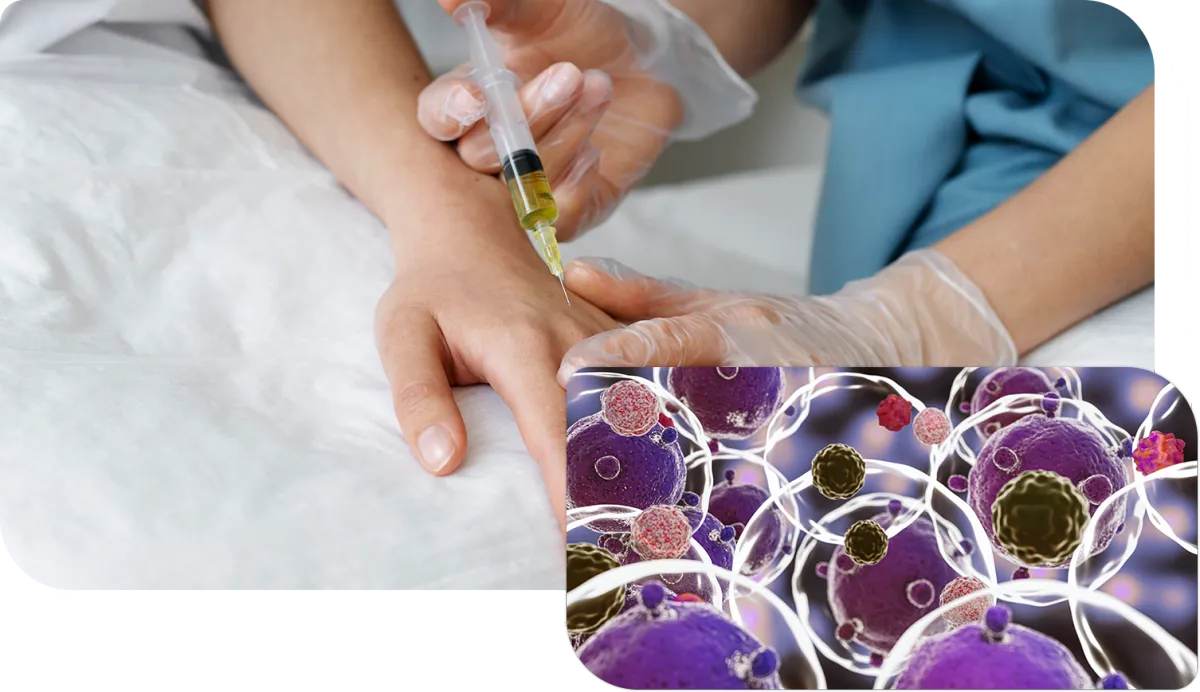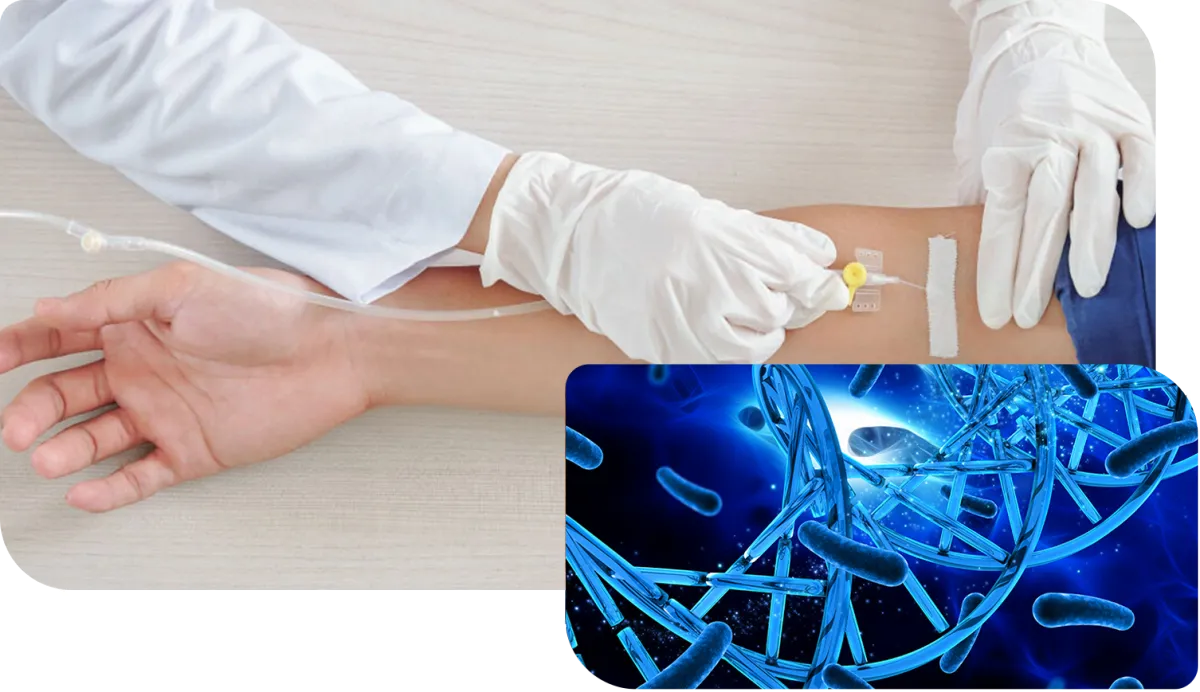



Autism
Stem cell regenerative treatment holds high potential in addressing the many challenges associated with autism spectrum disorder (ASD). Autism is a neurodevelopmental disorder characterized by impaired communication, repetitive behaviors, sleep disturbances, memory issues, mood fluctuations, learning disabilities, speech disorders, and cognitive impairments. It is a congenital condition that manifests from birth and conventional therapies alone often fall short in providing comprehensive relief.
Traditional treatments, such as anticonvulsants and psychoactive drugs, aim to alleviate specific symptoms, but they may lead to unwanted complications for both patients and caregivers. Conventional interventions like speech therapy, cognitive-behavioral therapy, hormone therapy, and social skills training also have limitations in addressing the root causes of autism.
While there is no scientific evidence that suggests there is any kind of ultimate cure for autism, stem cell therapy offers a novel approach that goes beyond mere symptom management.

Mesenchymal Stem Cell Therapy
Stem cell regenerative therapy presents a revolutionary avenue for exploring effective autism treatment. Research indicates that stem cells possess a unique ability to influence metabolism and the immune system, facilitating the natural restoration of damaged cells and tissues. Importantly, this approach minimizes the risk of rejection or allergies since the therapy utilizes the patient's own stem cells.
Mesenchymal stem cells (MSCs) are effective for treating autism, with great results, and by also treating with neural stem cells (NSCs) it is another 40-50% more effective. We have found that by just treating with normal MSCs alone that 50% of our non- verbal patients speak their first word within 3 months.
How it Works
Neural stem cells (NCSs) offer several avenues to tackle the challenges associated with autism further than MSCs alone. This encompasses promoting neurogenesis and repairing brain areas affected by structural anomalies or connectivity deficits, thereby enhancing overall neural circuitry. These cells also have the potential to regulate neurotransmitter imbalances observed in autism, restoring effective communication among brain cells and ameliorating cognitive and behavioral symptoms. By modulating the immune response and reducing neuroinflammation, neural stem cells could alleviate many symptoms associated with ASD. Their role in fostering neural connectivity by forming new synapses between neurons could enhance communication between brain regions, potentially addressing social and communication deficits inherent in autism. The augmentation of neuroplasticity through neural stem cells could facilitate adaptive rewiring in response to therapies and experiences, yielding enhanced cognitive and behavioral outcomes. Additionally, the inherent production of growth factors by neural stem cells can positively influence neuronal growth, survival, and differentiation, ultimately aiding in the restoration of proper brain function for individuals with autism.
Why it Works
Through the regenerative potential of stem cells, treatment can address not only specific symptoms of autism but also contribute to the restoration of various organs and systems within the body, including the central nervous system and the brain. This holistic approach enhances cognitive function, promoting behavior and communication skills, and potentially improving overall quality of life for individuals with autism. As ongoing research continues to demonstrate the therapeutic benefits of stem cell regenerative treatment, it offers hope for a more comprehensive and effective approach to managing the complexities of autism spectrum disorder.
We also offer ketamine therapy at the clinic, which also has shown promise in treating autistic symptoms. Using the stem cell regenerative treatment in combination with ketamine could have enormous benefits.

Ketamine Therapy
In individuals with autism, ketamine therapy has been reported to reduce anxiety and irritability, which are common issues experienced by people with ASD. Ketamine's rapid-acting antidepressant properties may also have a positive impact on mood and emotional regulation. Furthermore, ketamine's ability to modulate brain activity and promote neuroplasticity could potentially enhance cognitive functions and adaptive skills in individuals with autism, leading to improvements in learning and behavior.
How it Works
Studies have shown that ketamine, as an NMDA receptor antagonist, can alleviate severe autism traits. Its neuroprotective properties and ability to increase expression of the ADNP gene, a common cause of autism, indicate its potential to promote neuroplasticity and improve cognitive function in individuals with ASD. Ketamine therapy has been associated with reducing repetitive behaviors, enhancing social interactions, and mitigating sensory sensitivities, thus offering hope for better quality of life and functional outcomes for those with autism.
Why it Works
Ketamine, being an NMDA receptor antagonist, works by blocking the NMDA receptor's activity, leading to altered glutamate transmission in the brain. This mechanism is believed to contribute to ketamine's therapeutic effects in treating autism and other psychological conditions. While the exact underlying mechanisms are still being studied, the potential neuroprotective effects of low-dose ketamine and its impact on the ADNP gene suggest promising implications for autism treatment.
Benefits
While ketamine therapy is still a relatively new area of research for autism treatment, preliminary studies and anecdotal evidence suggest several potential benefits:
Reduction in Anxiety: Ketamine has been reported to reduce anxiety levels in individuals with autism, which can help improve overall emotional well-being and social interactions.
Decrease in Irritability: Ketamine therapy may lead to a reduction in irritability and aggressive behaviors often associated with autism, enhancing overall quality of life.
Rapid-Acting Antidepressant: Ketamine's rapid-acting antidepressant effects may help alleviate symptoms of depression, a common comorbidity in individuals with autism.
Enhanced Emotional Regulation: Ketamine's impact on mood regulation may lead to improved emotional regulation and better coping mechanisms.
Improved Social Functioning: By reducing anxiety and improving mood, ketamine therapy may contribute to better social interactions and communication skills in individuals with autism.
Enhanced Cognitive Function: Some studies suggest that ketamine's effect on brain plasticity may enhance cognitive abilities and learning in individuals with autism.
Increased Adaptability: Ketamine's ability to modulate brain activity may improve adaptability and reduce repetitive behaviors in those with autism.
Potential Neuroprotective Effects: Ketamine has shown neuroprotective properties in some studies, which could be beneficial in managing certain neurological aspects of autism.
Non-Opioid Alternative: Ketamine is a non-opioid medication, making it a potentially safer alternative for symptom management compared to traditional medications that might carry higher risks of dependency.
Despite the positive outcomes observed in animal models and anecdotal reports from clinicians and parents, further research and clinical trials are essential to validate and understand ketamine's role in managing autism effectively. As research progresses, ketamine therapy may provide a new avenue for addressing the challenges faced by individuals on the autism spectrum and improving their overall well-being.
Testimonials

"I have a diagnosis of multiple sclerosis and was involved in three rear end car accidents in the same year, resulting in a double fusion in L4 and L5. Prior to the car accidents. I had a slip and fall and a severe shoulder injury, leaving me without use of my right arm" ... I fed myself for the last three days using a spoon and a fork for the first time in over a year. "I am grateful!"
Jeannine Karklins,MS Diagnosis
Boca Raton, Florida

My Ketamine experience was by far one of the most profound healing journeys I've had so far in my life. I can honestly say I had no expectations going into my session. Dr. Ripley and his staff made me feel so welcomed, they were extremely compassionate and caring throughout the entire process. No detail was left unattended. As I entered the cozy suite, I truly felt as if I were in my own home. Dr. Ripley gave me a sense of peace of mind as he explained he will be monitoring my vitals all through the process. It was then, when I relaxed and gave into the journey. There were moments where I opened my eyes and felt so safe and comforted. The entire process lasted about an hour but I honestly felt I worked through years of unresolved trauma. As of today, I continue to benefit from having such an amazing ketamine experience with with Dr. Ripley and his team.
Jeannine Karklins,MS Diagnosis
Boca Raton, Florida
Office: Delray, Florida
Call 702 350 1277
Email: sales@bioregenwellness.com
Site: www.bioregenwellness.com
